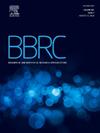Fusion of breast cancer MCF-7 cells with mesenchymal stem cells rearranges interallelic gene expression and enhances cancer malignancy
IF 2.5
3区 生物学
Q3 BIOCHEMISTRY & MOLECULAR BIOLOGY
Biochemical and biophysical research communications
Pub Date : 2024-10-23
DOI:10.1016/j.bbrc.2024.150887
引用次数: 0
Abstract
Fusion among normal cells is tightly regulated and required for the developmental processes of an organism. Cancer cell fusion appears relatively rare but is associated with generating new hybrid cancer cells with aggressive properties. However, it remains unclear how cancer cells acquire aggressiveness via cell fusion. Here, we report changes in cell proliferative capacity, cell motility, anticancer drug resistance, and gene expression profiles when fusing human MCF-7 breast cancer cells and mesenchymal stem cells (MSCs). The fused cells were established using envelopes of a hemagglutinating virus of Japan, which increased cell proliferation, motility, and drug resistance. Comprehensive gene expression profile analysis revealed that the fused cells expressed higher levels of glycolysis-related genes than their parental cells. In fact, the fused cells relied more on glycolysis for ATP production (Warburg effect). HIF1A, which induces the expression of glycolysis-related genes, was upregulated in fused cells compared to MCF-7 cells. Allele-specific expression analysis of the fused cells indicated that MSC allele-derived HIF1A efficiently induces the expression of glycolysis-related genes in the MCF-7 allele. These findings indicate that the reorganization of gene expression by combining MSCs and MCF-7 alleles resulted in the predominant expression of glycolysis-related genes and increased malignancy in the fused cells.
乳腺癌 MCF-7 细胞与间充质干细胞融合后,平行基因表达重新排列,增强了癌症的恶性程度。
正常细胞之间的融合受到严格调控,是生物体发育过程所必需的。癌细胞融合相对罕见,但与产生具有侵袭性的新杂交癌细胞有关。然而,目前仍不清楚癌细胞是如何通过细胞融合获得侵袭性的。在此,我们报告了人 MCF-7 乳腺癌细胞与间充质干细胞(MSCs)融合后,细胞增殖能力、细胞运动性、抗癌药物耐受性和基因表达谱的变化。融合细胞是利用日本血凝病毒的包膜建立的,它能增加细胞的增殖、活力和抗药性。全面的基因表达谱分析显示,与亲代细胞相比,融合细胞表达了更高水平的糖酵解相关基因。事实上,融合细胞更依赖糖酵解产生 ATP(沃伯格效应)。与 MCF-7 细胞相比,诱导糖酵解相关基因表达的 HIF1A 在融合细胞中上调。对融合细胞的等位基因特异性表达分析表明,间充质干细胞等位基因衍生的 HIF1A 能有效诱导 MCF-7 等位基因中糖酵解相关基因的表达。这些发现表明,间充质干细胞与 MCF-7 等位基因结合后基因表达重组,导致糖酵解相关基因的主要表达,并增加了融合细胞的恶性程度。
本文章由计算机程序翻译,如有差异,请以英文原文为准。
求助全文
约1分钟内获得全文
求助全文
来源期刊
CiteScore
6.10
自引率
0.00%
发文量
1400
审稿时长
14 days
期刊介绍:
Biochemical and Biophysical Research Communications is the premier international journal devoted to the very rapid dissemination of timely and significant experimental results in diverse fields of biological research. The development of the "Breakthroughs and Views" section brings the minireview format to the journal, and issues often contain collections of special interest manuscripts. BBRC is published weekly (52 issues/year).Research Areas now include: Biochemistry; biophysics; cell biology; developmental biology; immunology
; molecular biology; neurobiology; plant biology and proteomics

 求助内容:
求助内容: 应助结果提醒方式:
应助结果提醒方式:


